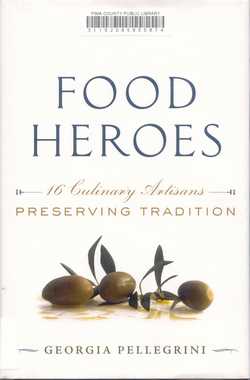Food Heroes
Georgia Pellegrini

“I am spending the morning watching men strike oil – the kind that flows freely through the underbelly of Provence. The owner of this place, Jean-Benoît Hugues, is striding around in his quilted vest and threadbare jeans, with his floppy hair and furrowed brow, carefully inspecting machines and overseeing workers. White vans drive in and out of the gates like clockwork in time to machines stripping, spitting, washing, shredding, and spinning.
It began with a plot of land elevated along a slope in Les Beaux and a promise to an old man that they would never build on it. It was called Castelas, a field of four- hundred-year-old trees where a mystical combination of rock, sun, and age produces the best olive oil of all the subsequent forty-five hectares the Hugues' purchased. And so an oil earned its name, a hobby became a profession, and a husband and wife, Jean-Benoît and Catherine, improved their own execution of small-scale olive oil production and established a strong terroir – the taste of a place.”
Thus begins the chapter on olive oil in Food Heroes: 16 Culinary Artisans Preserving Tradition. Written by Georgia Pellegrini, it's a set of stories about artisanal food and the people who love it and produce it. Ranging from the aforementioned olive oil to heirloom tomatoes, from single-origin chocolate to hand-massaged persimmons, it's a look at ways of life and ways of food that challenge the reader to think carefully about what he or she eats, and how it's produced.
Here is a passage from the chapter titled Fighting For Salami, about one of the last makers of traditional dry-cured sausages in the U.S.:
“This culinary art came from necessity. For centuries, curing meat was the way poor people lived off the land during the winter months. The natural phenomenon is a gift of nature that scientists don't understand and the USDA fears. Marc Buzzio embraces it, and carries it forward to a place of perfect proportion with the modern age. He composes in a year what a commercial producer makes in a day. And though he plans to expand, he is not going to grow beyond the point where he cannot maintain his tradition....And his education turned out to be useful in the dry-cured charcuterie business after all, because it helped him fight the government and win.
There are only a handful of people left in the country who are doing anything close to what Marc and Paul are doing, and most of them use a starter culture. They don't have access to bacteria that was smuggled in from Italy in the early twentieth century or the devotion to preserving a centuries-long tradition of good flavor. This is a salami worth fighting for.”
If you've ever wondered what it would be like to change your lifestyle completely, to drop everything and sell your own clotted cream butter, or start an olive farm, or take up sheep-raising and cheese-making, have a go with the food heroes found in these pages. Replete with histories and mouth-watering recipes, this book may just make you want to give something new (or something old) a try. Be sure to read all about it!
All Rights Reserved.